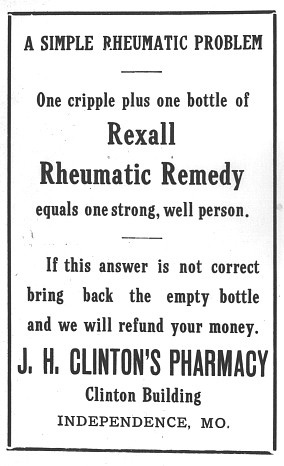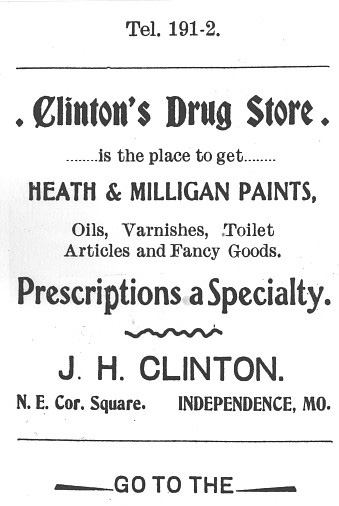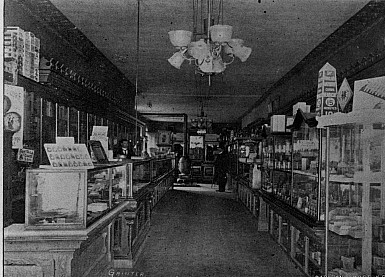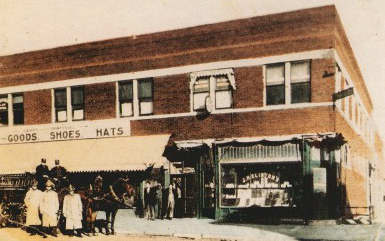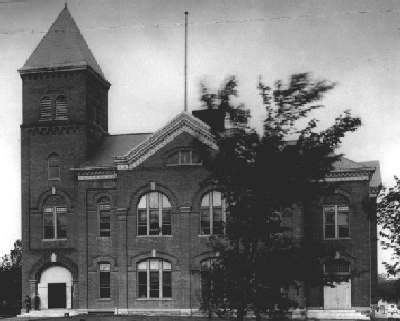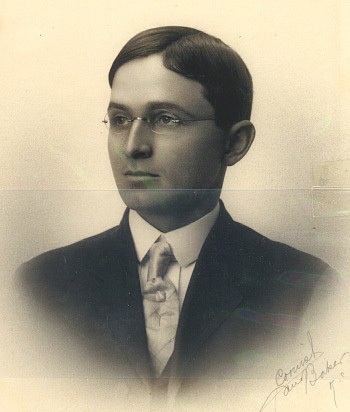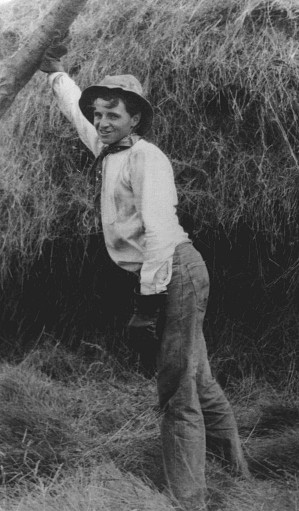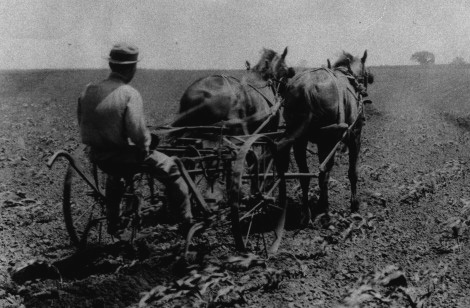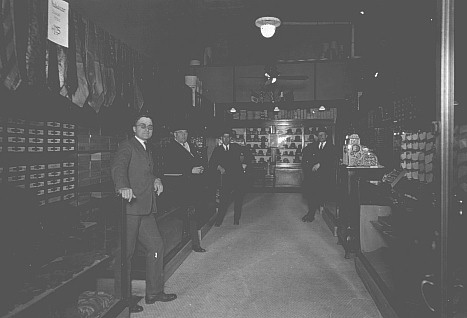By Sue Gentry
Independence Examiner Truman Centennial Edition May 1984
Harry S. Truman's first pay, three big silver dollars, was "the biggest thing that ever happened to me," he recalled in later years as he spoke of his job in the old Clinton Drug Store on the Independence Square. In his wildest dreams he never would have believed he would someday earn $100,000 a year as president of the United States.
Harry Truman was 14 and a high school student in the old Ott School on North Liberty at College Street when he went to work for Jim Clinton. The year was 1898.
"I was at work at 6:30 a.m. mopping floors, sweeping the sidewalk, getting everything in shipshape when Mr. Clinton came in," Mr. Truman wrote in his memoirs.
"When everything was in order, there were bottles to be dusted and yards and yards of patent medicine cases and shelves to clean. I never finished the bottles and shelves before school time and had to start the next morning where I'd left off. How I hated Latin-covered prescription bottles and patent medicine shelves! "The drugstore had plate glass windows in front with a big glass jar shaped like an enlarged Greek vase in each window.
Each vase was filled with colored water and oil in layers. How they kept those colors from mixing I don't know. Then the vases were surrounded by displays of patent medicine that had to be cleaned and dusted, and once a week the windows had to be washed and redecorated.
"You walked through the front door onto a tile floor with showcases on each side and a soda fountain on one side in front. Behind the cases on one side were interminable rows and rows of bottles with those Latin abbreviations on them. One in particular I remember because Mr. Clinton told me to be careful not to break it. He said no more Icy Toed Feet were to be obtained. The mark on the bottle was Ici. Toed. Foet. I never found out what it was.
"In the closet under the prescription case, which faced the front and shut off the view of the back end of the store, was an assortment of whiskey bottles. Early in the morning, sometimes before Mr. Clinton arrived, the good church members and Anti-Saloon Leaguers would arrive for their early morning drinks behind the prescription case at 10 cents an ounce. They would wipe their mouths, peep through the observation hole in the front of the case and depart.
"The procedure gave a 14-year old boy quite a viewpoint on the public front of leading citizens and 'amen-corner praying' churchmen.
"There were saloons aplenty around the Square in Independence and many leading men in town made no bones about going into them and buying a drink. I learned to think more highly of them than I did of the prescription counter drinkers.
"After a few months at this morning and night work, my high school studies became rather heavy, and my father suggested I quit my job and study harder, which I did." (Note: Clintons Drug Store is still standing and is a soda shop today on the Independence Square.)
In the fall of 1901, after graduation from high school, Mr. Truman worked for a contractor as a timekeeper on the Santa Fe Railroad. He kept his job until the contract was finished, living in hobo camps along the Missouri River where the Santa Fe ran.
Mr. Truman became familiar with hobos and their viewpoints, and learned what it meant to work 10 hours a day for $1.50. The contractor paid 30 cents an hour for a wagon team of horses and a driver.
"The pay-off took place in a saloon either in Sheffield or Independence," Mr. Truman recalled. "The object in paying the men in the saloon was to give them a chance to spend all their money right there and guarantee their being back to work on Monday morning. The checks were time checks and were signed by me as timekeeper. My pay was $35 per month and board, and I received a very down-to-earth education in the handling of men."
Mr. Truman's next job was at the National Bank of Commerce in Kansas City, also for $35 per month. His brother, Vivian, also worked there. "We worked in the part of the bank called the 'zoo' which handled the transit checks that came through the bank as a clearinghouse."
Soon Mr. Truman was promoted to personal filing clerk for the president and cashier of the bank at a salary of $40 per month.
Another move up came when he went to Union National Bank for $60 per month as a bookkeeper."
He and his brother boarded at 1314 Troost for $5 per week for room and board, including breakfast and dinner. 'We bought a l0-cent box lunch and spent the noon hour eating it in a 5-cent picture show."
In 1904, the family moved back to the farm at Grandview. In 1906, Mr. Truman went back to Grandview to manage the farm, where he remained until called into service in 1917. (See article about Farming Years)
After his return from World War I in 1919 and his marriage to Bess Wallace, Mr. Truman went into the haberdashery business with Eddie Jacobson, with whom he had worked in the successful operation of the canteen at Camp Doniphan. The store prospered until 1921 when, as Mr. Truman put it, "the Republicans took over the U.S. Government." "By 1922," Mr. Truman wrote, "values had fallen, our stock had shrunk and creditors and banks pressed us and we closed out, hopelessly in debt." It was a number of years before he and Jacobson finally paid off all debts from the business failure.
"It was a hard experience for me at the age of 38, to fail in a business venture in which I had spent considerable money and time," Mr. Truman wrote in his memoirs. "I have since come to realize that thousands of others went through similar experiences during those postwar years, although my difficulties came to be more widely publicized and distorted because I became president of the United States."
